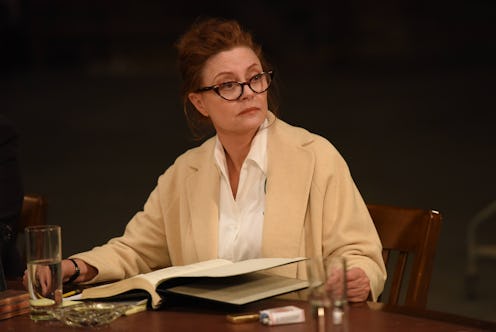
Good thing I adore Stanley Tucci because it doesn't get much worse than his portrayal of Jack Warner when it comes to misogyny and general offensiveness. During the April 9 episode, Warner is at peak despicableness again in his pursuit of another hagsploitation film on Feud. If you aren't familiar with this film subgenre, perhaps you thought that it was created just for Feud. However, you'll be sorely disappointed to discover that hagsploitation is a real term to describe a certain genre of horror films. No, it's not a legitimate word according to Oxford Dictionaries or anything like that, but this distasteful term shows a certain lack of respect for the actresses who starred in these types of movies — and that includes Joan Crawford and Bette Davis on Feud.
If you look up hagsploitation on Wikipedia, you will be directed to the page "psycho-biddy," which, frankly, isn't any better. Both of these blend words use disparaging terms for older women — "hag" and "biddy" — to not only indicate how unattractive the female characters are in these types of films, but to also show that these characters are psychotic. At least "hagsploitation" has the decency — no, scratch that — self-awareness to include "exploitation" in its word to acknowledge the fact that the women in these films are typically being unfairly taken advantage of by Hollywood.
Slate Donaldson of the "Slums of Film History" podcast defines "hagsploitation" as a movie that "takes a formerly-glamorous older actress and turns her into a psychopath in order to drive ticket sales." Beyond this highly accurate definition, he devotes an entire episode to the subgenre and it's absolutely worth a listen for people who can't get enough of old Hollywood and Feud. (Plus, Donaldson and his cohost even give a shoutout to American Horror Story and the roles it provides for women like Jessica Lange in this 2015 podcast — before Feud was announced.)
Donaldson notes how 1950's Sunset Boulevard can be considered hagsploitation, but that 1962's What Ever Happened to Baby Jane? really is the definitive film of the subgenre. That backs up Warner's claim in Feud that he had a hand in creating hagsploitation. After he sees the success of Baby Jane knock-offs — like the Crawford-starring Strait-Jacket and the Olivia de Havilland-starring Lady in a Cage (with a young James Caan!) — Tucci's Warner discusses how degradation is one of the selling points of the genre in the aptly-titled episode "Hagsploitation." That means that, at least in Feud, Warner is fully aware that he is capitalizing on the fact that Hollywood and the public no longer found these "harpies" (obviously his word, not mine) attractive or worthy of attention — unless, of course, they were portraying characters who were manically and melodramatically losing their grip on reality.
More movies in the horror genre of hagsploitation continued being made and Feud is showing part of that with the behind-the-scenes look of Davis and de Havilland's Hush... Hush, Sweet Charlotte. And the genre went beyond Davis, Crawford, and de Havilland in the '60s and '70s with movies like The Night Walker (with Barbara Stanwyck), What Ever Happened to Aunt Alice? (with Geraldine Page), and What's the Matter with Helen? (with Shelley Winters and Debbie Reynolds). Apparently, question titles are also a huge part of the genre since Winters, who boosted her career with hagsploitation in the '70s, starred in the outrageously-named Whoever Slew Auntie Roo?.
While the name of hagsploitation is insulting, it aptly fits the genre since — as Warner stated in Feud — the idea of humiliating these women to create box office hits was kind of the point. That doesn't necessarily take away from the phenomenal and thoroughly delicious performances that some of these aging actresses gave in hagsploitation films, but it does make your feminist mind spin thinking about if male actors would ever experience a degrading trend that would earn its own equally degrading name. I'm gonna say, probably not, which is what makes this entertaining genre unfortunately innately sexist and ageist.